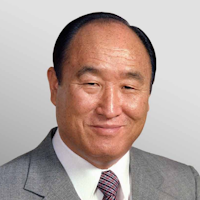World peace can be fully accomplished only when the wisdom and efforts of the world’s religious leaders, who represent the internal concerns of the mind and conscience, work cooperatively and respectfully with national leaders who have much practical wisdom and worldly experience…
Sun Myung Moon

The Religious Leaders of the World
Topic: Justice, Vision, & Leadership
“World peace can be fully accomplished only when the wisdom and efforts of the world’s religious leaders, who represent the internal concerns of the mind and conscience, work cooperatively and respectfully with national leaders who have much practical wisdom and worldly experience about the external reality, or “body.” In this light, it is time for us to give serious consideration even to the prospect of restructuring the United Nations. For example, perhaps it is possible to envision the United Nations as a bicameral institution.
The existing United Nations structure, composed of national representatives, may be regarded as a congress where the interests of each member nation are represented. However, I submit that serious consideration should be given to forming a religious assembly, or council of religious representatives within the structure of the United Nations. This assembly or council would consist of respected spiritual leaders in fields such as religion, culture and education. Of course, the members of this interreligious assembly will need to have demonstrated an ability to transcend the limited interests of individual nations and to speak for the concerns of the entire world and humanity at large.
The two chambers, working together in mutual respect and cooperation, will be able to make great advances in ushering in a world of peace. The wisdom and vision of great religious leaders will substantially supplement the political insight, experience and skill of the world’s political leaders.”
Sun Myung Moon, born on January 6, 1920, was a spiritual leader and luminary hailing from North Korea. He founded the Holy Spirit Association for the Unification of World Christianity, better known as the Unification Church, in 1954. Drawing upon direct Prophetic revelation, influenced by the major faith traditions—especially Christianity, but also Judaism, Islam, Confucianism, and Buddhism. He also developed a political philosophy to resist the spread of the anti-religious Communist ideology. Reverend Moon's teachings centered on love, unity, and peace. He aimed to spark a global spiritual movement that transcended religious and cultural divisions, and his vision resonated with followers all over the world. Through the Unification Church, Sun Myung Moon also promoted interfaith understanding and collaboration, striving for harmony among diverse religious traditions.
Reverend Moon's teachings went beyond the realm of the spiritual to touch on the universal human themes of love and family. He emphasized the importance of nurturing strong, loving families as the cornerstone for a harmonious and peaceful world. To this end, he conducted mass wedding ceremonies known as the 'Blessing', symbolizing the unity of all people under God, regardless of their cultural or religious backgrounds. Moon also stressed the value of community service and encouraged his followers to actively contribute to their local communities.
Sun Myung Moon's partner in both life and work was his wife, Hak Ja Han Moon. As co-leader of the Unification Church, she is a pivotal figure in spreading their shared vision of a world unified by love and peace. Affectionately known as 'True Mother', she embodies the ideal of nurturing and unconditional love in their teachings. After Reverend Moon's passing in 2012, Hak Ja Han Moon assumed sole leadership of the Unification Church and changed the name to Heavenly Parent's Holy Community. In her leadership role, she has tirelessly carried forward their mission, upholding the church's emphasis on peace, interfaith dialogue, and strong, loving families. Under her guidance, the church has continued to flourish, spreading its message of unity and love to people around the globe.
Universal Peace Federation
Wilson, Andrew, editor. World Scripture II. Universal Peace Federation, 2011, pp. 1100-01 [Sun Myung Moon (August 18, 2000)].

Sun Myung Moon
Resources
- Headwing Philosophy and the Law of Nations (Journal of Unification Studies)
- The Inter-religious Council at the United Nations: Universal Peace Federation's Founding Vision
- Universal Peace Federation: A global network of peacebuilders
- In Praise of the Rev. Sun Myung Moon Dr. Richard L. Rubenstein
- He Helped to Make Me a Better Human Being Dr. Morton A. Kaplan Distinguished Service Professor in Political Science, Emeritus, The University of Chicago
- Dr. Nicholas N. Kittrie, KtSJ Chairman, Eleanor Roosevelt Institute for Justice and Peace, Washington, D.C.
- Cheon Seong Book 10, The Philosophy of Peace: Godible Episode 322,
Copyright © 2017 – 2025 LuminaryQuotes.com About Us

A Religious Council at the United Nations
Reverend Moon’s proposal to establish a religious council at the United Nations would create a check on the vested interests of the leaders of the nation-states that currently constitute it. Such a religious council would be more aware of those who are marginalized and help insure that that any UN action considers their well being. If the United Nations could not be reformed along these lines, some other institution would need to arise to accomplish this purpose. If the United Nations fails to reform, those who understand the importance of headwing ideology should be in the vanguard to bring such an international institution into existence.
–Gordon L. Anderson [Headwing Philosophy and the Law of Nations (Journal of Unification Studies Vol. 6, 2004-2005)] pp. 85-96
Universal Peace Federation
Universal Peace Federation (UPF) is an NGO in Special Consultative Status with the Economic and Social Council of the United Nations. Other UPF programs include: Interfaith; peace and security; marriage and family; peace education; youth and service.
The United Nations and World Peace
(1) After the First World War, expectations were high that a world of peace would emerge, a world free from war, based on the League of Nations. But less than three decades later, war broke out again. Nevertheless, people’s innate inclination to pursue peace remained unchanged. We desire to advance toward a world of peace, even if we have to die for it. That is why, after the Second World War, the League of Nations was dissolved and the United Nations was founded. In the belief that all people are brothers and sisters, we entered an era when the victorious nations gave the defeated nations their independence and protected and nurtured them in the name of brotherhood. Now, the military conflicts that arose during the Cold War have come to an end. The Third World War has been an ideological war. The Soviet Union and the United States are both reluctant to fight. Now, whether they like it or not, we must proclaim for the sake of peace, “God exists!” and explain what the world should be like. Unless we do so, there is no way for the world to be brought under God’s dominion. Because I understood this, I presented a worldview and a universal teaching based on the absolute values of God, and I systemized a principle by which we can liberate even God Himself.
The renewal of the United Nations and world peace
(2) Now we need to create the model for a nation of peace. We are working to bring world peace through unity at the United Nations. We need to help the United Nations stand in the position to lead all the nations of the world. I included the word “peace” in the names of numerous organizations that I founded, including the Inter-Religious Federation for World Peace, the Federation for World Peace, and the Professors World Peace Academy. This is because I have set my sights on the United Nations. I have been preparing for this for decades. Originally the United Nations was meant to set the standard that nations should follow. It was meant to lead the way to peace for humankind.
(3) For a world that is comprised of individual nations to become a world of peace is not something that can be done overnight. It requires a long period of time. In order to transform something, we need a model. If there were a model nation such that people would say, “Wow, when we follow that, our nation will develop!” and if the environment were such that the United Nations could promote it and every nation could support it, all nations would be bound to follow it. That is why the work I am doing now is welcomed by the developing nations. There are only a small number of advanced nations—the G7, or the G8. Apart from them, many other nations are developing. If the United Nations were to uphold one model as a nation of peace, then all UN member states would naturally turn in that single direction.
(4) The present United Nations cannot achieve world peace. Every nation is fighting for its own benefit. This is not correct; it is not conscientious. That is why a religious assembly, centered on the conscience, should be part of the United Nations. The Women’s Federation for World Peace is working behind the scenes. Providentially, women should play a central role in bringing about world peace; otherwise, people will continue to fight. Women need to form an organization that can stand at the center, embrace Cain and Abel, and create an atmosphere of peace throughout the world.
(5) Who should lead world peace? God should lead it. God should lead both the religious realm and the political realm. I am advocating a United Nations of the religious realm. Furthermore, I am advocating a Women’s UN. These two organizations must be created. This is how present-day humanity will be brought into alignment with God’s plan.
(6) Politics alone cannot change the world. We are dealing with the political arena, but it is extremely corrupt. Families in their current state are dysfunctional, and they cannot correct this. That is why we need religions to unite and rally the world on the right path, the shortest way to a world of peace.
–Sun Myung Moon [Cheon Seong Gyeong Book 10: The Philosophy of Peace, Section 3: The United Nations and World Peace (06)].